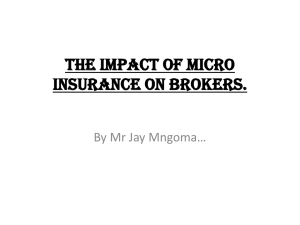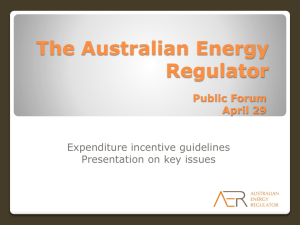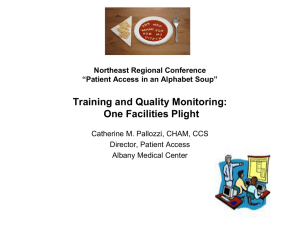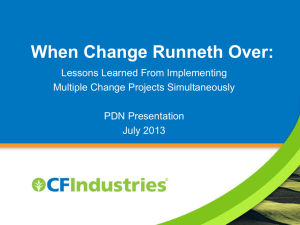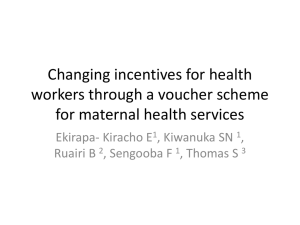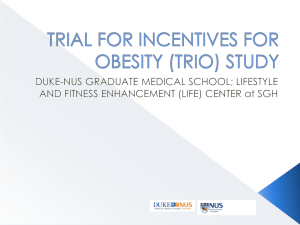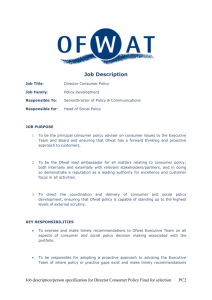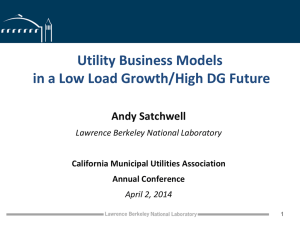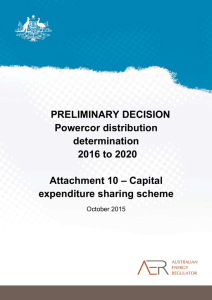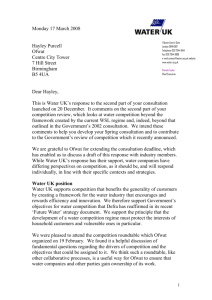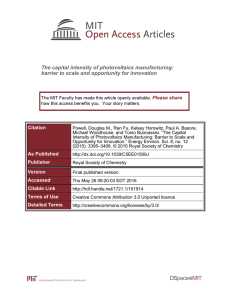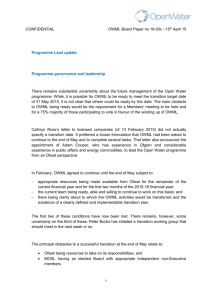Ofgem`s review of RPI - X
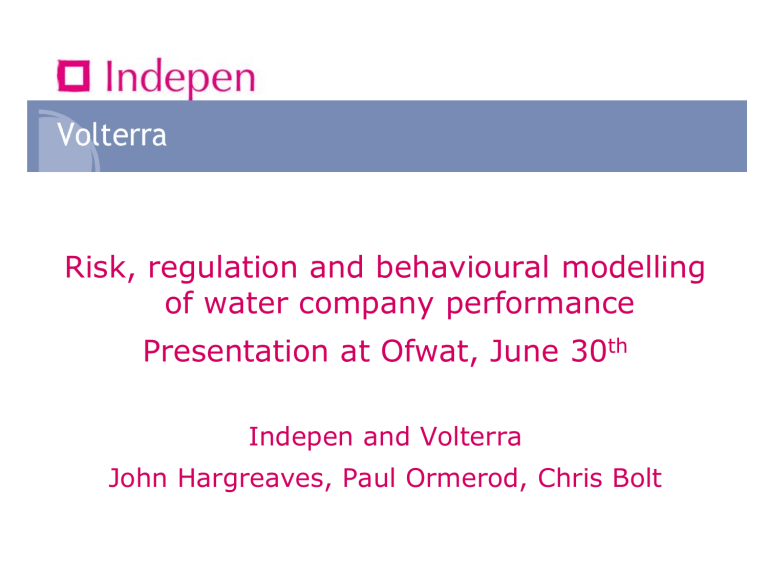
Risk, regulation and behavioural modelling of water company performance
Presentation at Ofwat, June 30
th
Indepen and Volterra
John Hargreaves, Paul Ormerod, Chris Bolt
Agenda
Introduction
Presentation of the approach
Questions about the approach
John Hargreaves
Paul Ormerod
All
Discussion – possible applications All
Wind up Chris Bolt
1
Context
Ofwat’s future regulation project
Indepen reform project with a group of WaSCs
• Objective – to ensure the views of companies and investors are influential
• Including extensive engagement with
– Ofwat
– other regulators
– investors
• Identified wide interest in some questions, including
– What is the right framework for water regulation?
– The transmission mechanism – what happens when Ofwat pulls a lever?
– Design of specific incentives, for example should incentives be symmetrical
2
The project
Began with a discussion with Paul and colleagues at Volterra
• Techniques that could help explore the questions
• Behavioural modelling worth a try
• Proposal for a feasibility project
Sponsorship by
• Severn Trent
• Wessex
• Anglian
Ofwat membership of steering group
Interactive approach – consultants, companies and Ofwat
Report on the feasibility stage
• Today’s session
• Report to follow
3
What is Agent Based Modelling - ABM?
• Agent = decision maker
• Model = map
• Tries to capture the behavioural rules of decision makers
• Like a map, simplifies dramatically: reflects most important features of a problem and leaves out detail
• Recognises that uncertainty is inherent in most situations, usually a stochastic element
• Usually solved by numerical simulation rather than analytically
4
Some ABM models
• Financial Services Authority
• Department of Health
• South West Regional Health Authority
• British Telecom
• Svenska Handelsbanken
5
Outline of model (1)
• Agents
• regulator
• water companies
• customers
• Regulator sets quality improvement target (QIT) for each company
• Company type defined by attitude to risk & quality
• Company types make different decisions on how much capex they will need to try to meet QIT
• Regulator assigns penalty or reward to each company, given its quality performance
6
Outline of model (2)
• Customer utility depends on quality and price
• Companies’ profits determined by revenue (a function of price) and costs (a function of capex, opex, maintenance spend plus any reward or penalty)
• Companies have imperfect knowledge – they are unsure about the quality improvement delivered by a given capex
• Initial level of quality of each company and degree of risk aversion of companies drawn at random from (fixed) ranges, so no two solutions of the model are the same
• We can interrogate the model to explore the impact of variations on outcomes for customers and companies
7
Outline of model (3)
8
Types of company
Quality
• Satisficers – try to meet the quality improvement target (QIT)
• Emphasisers – try to exceed the QIT
Risk
• Neutral – spend just the capex they think is required
• Averse – spend more to reduce the chance of failing to meet the
QIT
Four types of company
• Risk neutral emphasisers
• Risk averse emphasisers
• Risk neutral satisficers
• Risk averse satisficers
9
Relationship between capex and quality
Quality Improvement (%)
0 10 20 30
Capex
40 50 60
10
Types of customer
• Three types of customer
- Price focused utility functions
- Quality focused utility functions
- Mixed
• The model brings out the need to know more about customers’ utility functions
11
Regulator
• Determines for each company
- allowed revenue and opex
- the QIT
- financial penalties for not meeting QIT
- financial rewards for exceeding QIT
• Determines cost of capital for the sector
12
Outputs of the model
• Water bills
• Performance in terms of an index of quality
• Change in consumer utility
• Profits
13
Results (1)
• Work-in-progress
• Results so far suggest we can simplify the relationships and structures to build a model that advances understanding
• Provisional results
- Satisficers get higher penalties, as do risk neutral companies
- Emphasisers on average get rewards for over-achieving on quality, more so if they are risk averse
- Occasionally, satisficers can get rewards and emphasisers can get penalties
- Penalties and rewards are low as a proportion of company costs
- Despite the higher penalties, satisficers typically make significantly bigger profits than emphasisers
14
Min
1 st Q
Mean
3 rd Q
Max
Results (2) - profit (as % of costs)
Emph &
Neutral
7.5%
12.8%
15.0%
17.2%
21.7%
Emph &
Averse
5.8%
11.7%
14.0%
16.4%
21.8%
Satis &
Neutral
15.6%
17.8%
19.0%
20.3%
22.2%
Satis &
Averse
14.2%
17.0%
18.2%
19.4%
22.2%
15
Results (3)
Price sensitive customers
• better off with satisficing and risk neutral companies that spend less on capex and charge less
Quality sensitive customers
• better off with emphasisers than satisficers and slightly
• better off with risk averse than with risk neutral companies that spend more to achieve better quality
Equal interest customers
• better off with satisficing companies
• adverse effect of price increases incurred by customers of emphasising companies outweighs beneficial effect of quality improvement
16
Simplifications (1)
Services and outcomes
• Model relates to a single service with one price cap - referred to as a water service but could any other service
• Uses a quality index and a single capex number rather than different aspects of quality and types of capex
• Company decision is how much capex to incur to achieve quality improvement: we have not modelled capex aimed at improving efficiency
• Random distribution of initial endowments (e.g. initial quality, maintenance cost) and behavioural characteristics (risk appetite and attitude to quality)
• We have not modelled variations in companies’ circumstances, such as geographical, demographic or hydrological factors
17
Simplifications (2)
Company behaviour
• We have considered the effect on company behaviour of two drivers - attitude to quality and appetite for risk. We have treated these as independent and exogenously determined. We did not explore any linkage between financial structure and risk appetite.
Customer utility
• We have used a linear utility function, whereas company research suggests the presence of non-linearity in some cases or for some customers. This is an area for further exploration
18
Simplifications (3)
Incentives
• The incentive element of the model is around capex and quality.
Excludes incentives, such as SIM or leakage.
• Not incorporated any comparative competition, where the outcome for a company depends on what others do.
• There are multi-period aspects to water regulation including retrospective incentives. Model relates to one five-year control period, with decisions by the regulator and the companies taken at the beginning of the period and results materialising at the end, or ,in the case of the bill increase, at the beginning of the next period.
19
Possible extensions
Incentive design
• Understanding the effects of changes in the nature, power and symmetry of incentives
• Use of comparative information in setting incentives
Modelling assumptions
• Additional complexity in assumptions about utility functions
• Other motivations and behaviours of the companies, e.g. capex to increase efficiency
Other
• Catchments or flood management - where a range of agents with different incentives and powers are involved
• Simulating policy options for evaluation purposes
20
